My interest in aging came from a personal direction: I was getting older — and so were the baby boomers, who were fast approaching fifty. In this youth-oriented culture, aging is a profound source of suffering, and that is what I was responding to when I decided to turn my attention to conscious aging workshops, and to writing this book.One evening in February 1997, I was in bed at home in Marin Country, contemplating how to end this book. I’d been working on the manuscript for the past eighteen months, weaving together material from personal experience and from talks I’d given around the country on conscious aging, but somehow the book’s conclusion had eluded me. Lying there in the dark, I wondered why what I’d written seemed so incomplete, not quite rounded, grounded, or whole. I tried to imagine what life would be like if I were very old — not an active person of sixty-five, traveling the world incessantly as a teacher and speaker, caught up in my public role — but as someone of ninety, say, with failing sight and failing limbs. I fantasized how that old man would think, how he’d move and speak and hear, what desires he might have as he slowly surveyed the world. I was trying to feel my way into oldness. I was thoroughly enjoying this fantasy when the phone rang. In the process of my fantasy, I’d noticed that my leg seemed to have fallen asleep. As I got up to answer the phone, my leg gave way under me and I fell to the floor. In my mind, the fall was still part of my “old-man fantasy.” I didn’t realize that my leg was no longer working because I’d had a stroke.I reached for my phone, on the table near my bed.“R. D.? Are you there?”I heard the voice of an old friend in Santa Fe. When I didn’t respond coherently, he asked, “Are you sick?” I suppose I still didn’t answer, so he said, “If you can’t speak, tap on the phone. Tap once for yes and twice for no.” When he asked whether I wanted help, I tapped “no” over and over again. Nonetheless, he contacted my secretaries, who live close by, and the next thing I knew they rushed into the house and found me on the floor. There I was flat on my back, still caught in my “dream” of the very old man, who had now fallen down because his leg wouldn’t work. My assistants seemed very frightened; they called 911.
My next recollection is of a group of young firemen, straight out of central casting, staring into the old man’s face while I observed the whole thing as if from a doorway to the side. I’m told I was immediately rushed to a hospital nearby, but all I remember is being rolled down the hospital corridors, looking up at the ceiling pipes and the concerned faces of nurses and friends. I was fascinated by what was happening.Only afterward did I learn that I had a stroke and realize how close to death I had actually been. The doctors told my friends I had a massive cerebral hemorrhage, and only a ten percent chance of survival. I noticed the looks of deep concern on the faces of the doctors and my friends, but the thought of dying was nowhere in my mind, so I was perplexed by their grave expressions.Three hospitals and hundreds of hours of rehabilitation later, I gradually eased into my new post-stroke life as someone in a wheelchair, partially paralyzed, requiring round-the-clock care and a degree of personal attention that made me uncomfortable. All my life I had been a “helper”; I had even collaborated on a book called “How Can I Help?” I now found myself forced to accept the help of others, and to admit that my body needed attention. Because I’d spent my adult life concentrating on the realms of the spirit, I’d always been able to rationalize the distance I maintained from my body by saying that my detachment was a spiritual witnessing of the physical form. But that had been only partly true. The truth is that I distanced myself from my body.
I saw my body as merely a vehicle for the soul. I ignored it as much as possible and tried to spiritualize it away.From a physical perspective, the lack of love I’d shown toward my body contributed to my stroke. I was negligent about taking my blood pressure medicine and, a month before the stroke, ignored an unusual one-side hearing loss while scuba diving in the Caribbean. Before the stroke, although I was in my 60’s, I saw myself as young and powerful, with my MG, golf clubs, surfing, and speaking gigs. Illness had shattered my self-image, and opened the door to a new chapter in my life.After any major physical “insult,” as they call it, it’s all too easy to see yourself as a collection of symptoms rather than as a total human being, including your spirit — and thus to become your illness. Fear is powerful and contagious, and at first I allowed myself to catch it, worried that if I didn’t do what the doctors ordered, I’d be sorry. But now I’m learning to take my healing into my own hands. Healing is not the same as curing, after all; healing does not mean going back to the way things were before, but rather allowing what is now to move us closer to God.For example, since my speech was severely impaired by this stroke, I considered not speaking publicly anymore, since the words came so slowly, but people insisted that my halting new voice enabled them to concentrate on the silence between the words. Now that I speak more slowly, people tend to finish my sentences for me, and thus to answer questions for themselves. Though I once used silence as a teaching method, it now arises without my control and allows for a sense of emptiness, an emptiness that listeners can use as a doorway to their inner quiet.My guru once said to a visitor complaining about her suffering, “I love suffering. It brings me so close to God.” In this same way, I’ve learned that the incidents associated with aging — including this stroke — can be used for our spiritual healing, provided we learn to see through new eyes.Although my outward life has been radically altered, I don’t see myself as a stroke victim. I see myself as a Soul who’s watching “him” experience the aftermath of this cerebral hemorrhage. Having accepted my predicament, I’m much happier than I was before. This troubles some of the people around me. They have told me that I should fight to walk again, but I don’t know if I wanted to walk. I’m sitting — that’s where I am. I’m peaceful like this and I am grateful to the people who care for me. Why is this wrong? Though I can now stand and move around with a walker, I’ve grown to love my wheelchair (I call it my swan boat) and being wheeled about by people who care. They carry Chinese emperors and Indian maharajas on palanquins; in other cultures, it’s a symbol of honor and power to be carried and wheeled. mm
I don’t believe it’s all-important to be what our culture calls “optimal.” Before the stroke I wrote a great deal about the terrible things that can happen in aging, and how to cope with them. Now I’m happy to say that having gone through what some would view as the worst, it’s not so bad after all.Getting old isn’t easy for a lot of us. Neither is living, neither is dying. We struggle against the inevitable, and we all suffer because of it. We have to find another way to look at the whole process of being born, growing old, changing, and dying, some kind of perspective that might allow us to deal with what we perceive as big obstacles without having to be dragged through the drama. It really helps to understand that we have something — that we are something — which is unchangeable, beautiful, completely aware, and continues no matter what. Knowing this doesn’t solve everything — this is what I encountered and told about in “Be Here Now,” and I’ve still had my share of suffering. But the perspective of the soul can help a lot with the little things, and it is my hope that you’ll be able to take from this book some joy in being “still here.”Recently, a friend said to me, “You’re more human since the stroke than you were before.” This touched me profoundly. What a gift the stroke has given me, to finally learn that I don’t have to renounce my humanity in order to be spiritual — that I can be both witness and participant, both eternal spirit and aging body. The book’s ending, which had eluded me, is now finally clear. The stroke has given me a new perspective to share about aging, a perspective that says, “Don’t be a wise elder, be an incarnation of wisdom.” That changes the whole nature of the game. That’s not just a new role; it’s a new state of being. It’s the real thing. At nearly seventy, surrounded by people who care for and love me, I’m still learning to be here now.
– Excerpt from Still Here: Embracing Aging, Changing and Dying by Ram Dass

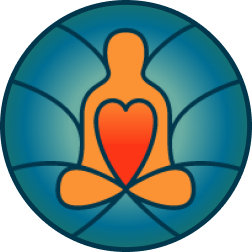



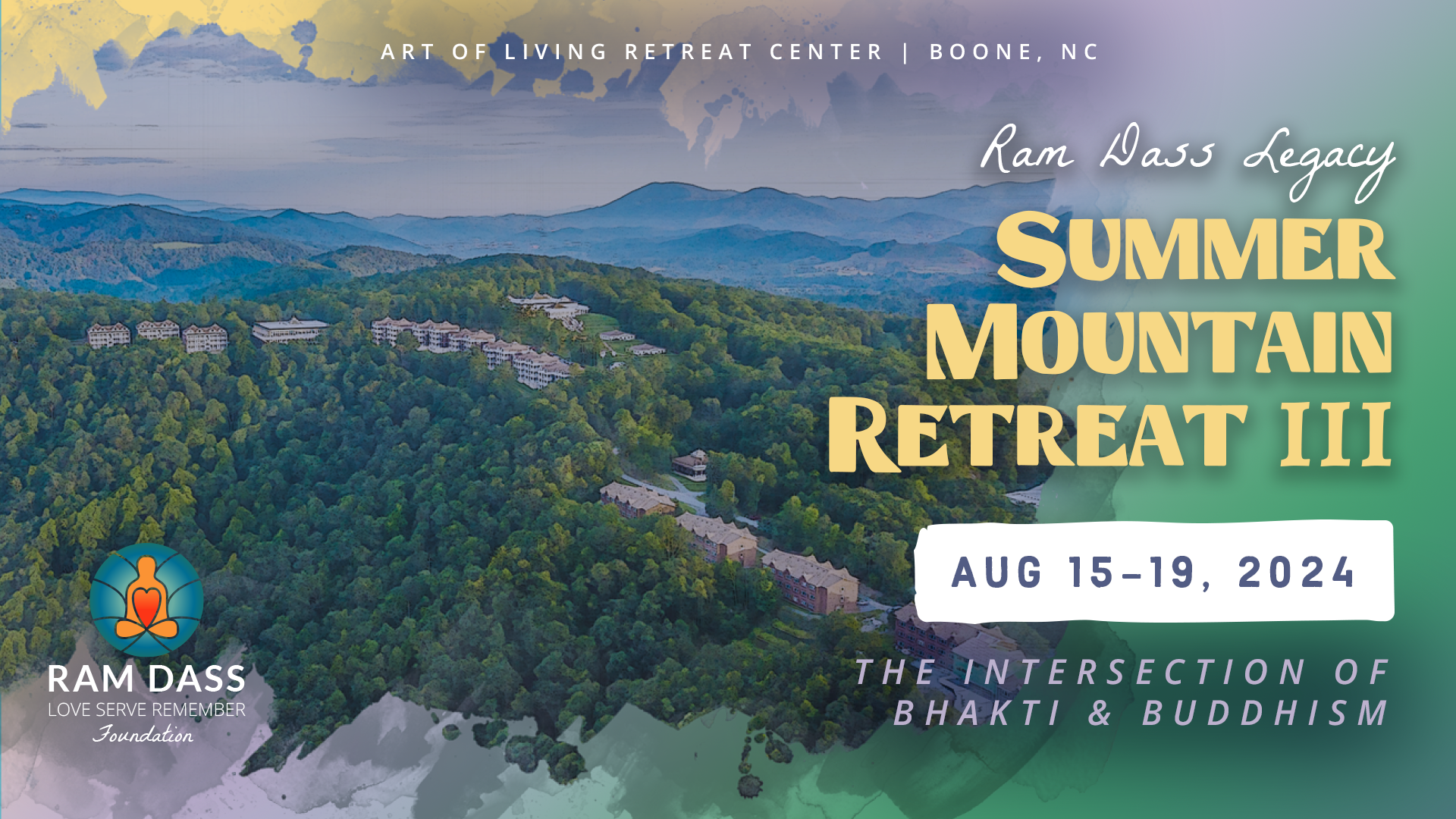
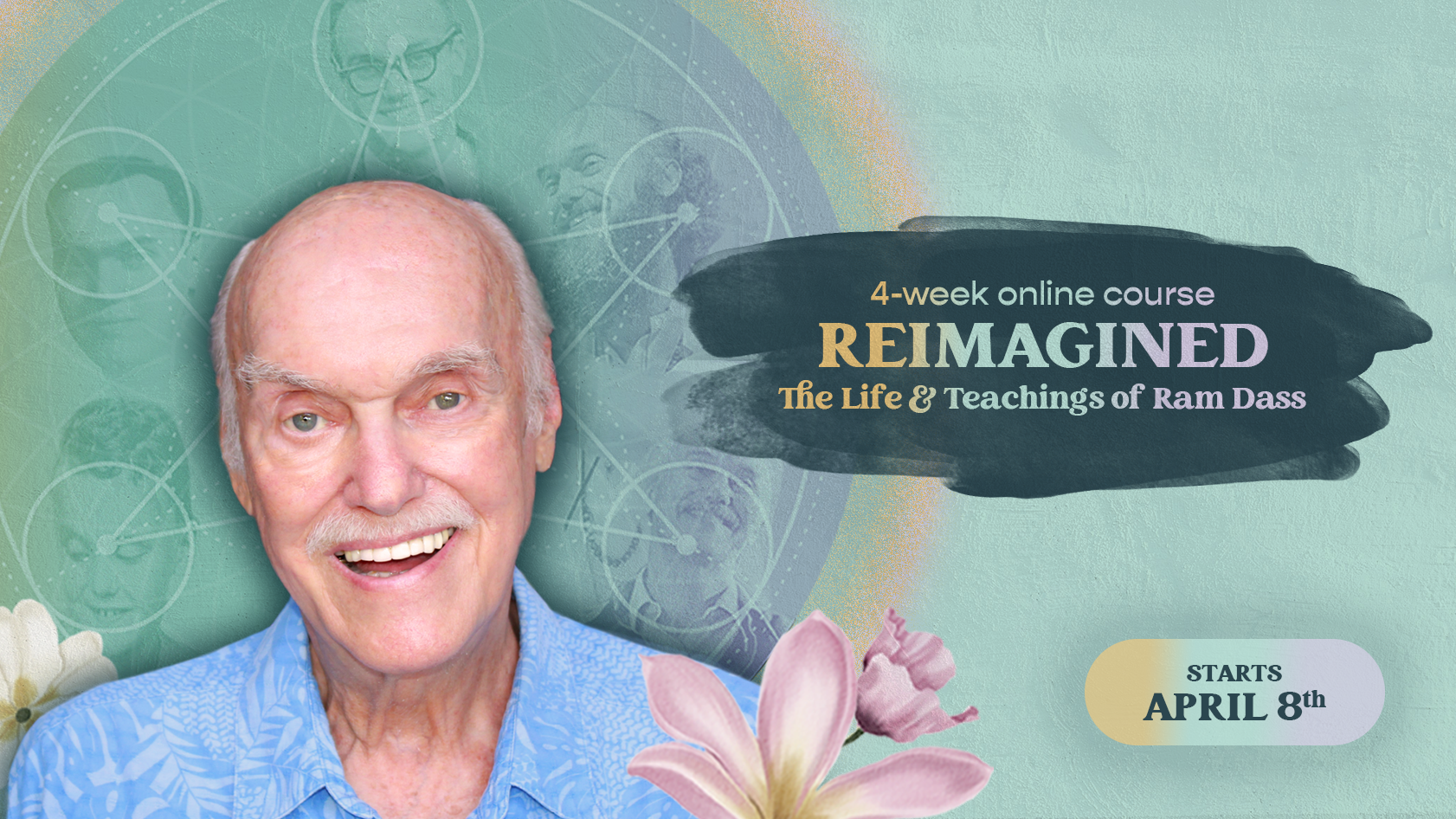
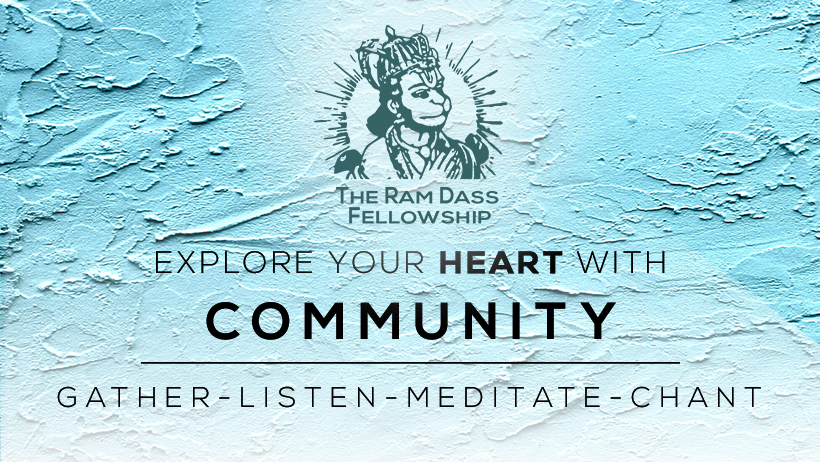

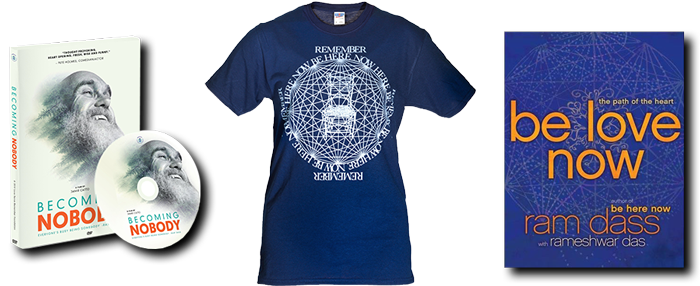

Thank you, Ram Das, for still being here and illuminating the world with your shining presence!
I was with you in Frankfurt viewing your guru floating over us as you spoke, Í touched your foot as a gesture of thanks , ignorant of the meáning, you came off the stage and held me and offered to meditate with me, as we started I noticed i was against your body and you had the form of a man, like yourself I had never considered this part of you, so I ran away, thank you for being and helping me be.
Thank-you for this new way of seeing aging; I particular love; “You’re more human since the stroke than you were before.” Compassion is experiential, a learned response to the slings and arrows one encounters. Life is beautiful when it is slowed down, and there is much closeness to the Creator, too. My husband Len has had two strokes, and he is funnier than ever~! He laughs all the time, especially when he just let’s go and lives life in the here now. Nothing matters more than love. It is infinite and divine as we build up the inner spirit to zipline outta here into the Great Beyond…which may be here now too…<3
I remover being at Lama Foundation in Taos the summer of 1969. I was 12 years old and studied Tea Ceremony. Can’t temper the name of the lively teacher but she made a lasting impression. That summer shaped my life. I’m full of gratitude for the experience.
thank you
So beautiful! The journey of our lives summed up in a very very poignant and enlightened perspective. Thank you Ram Dass💜